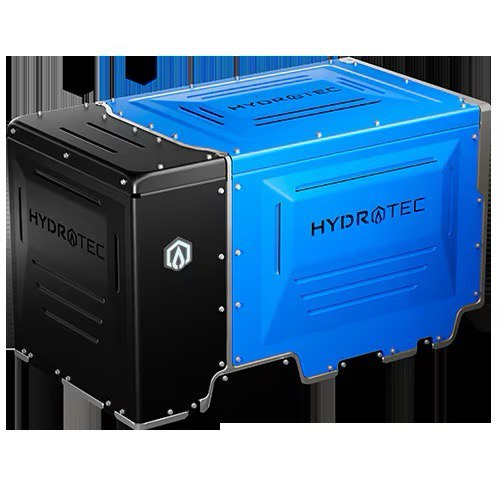“Your road map to hydrogen fuel cell power is simple — use the HYDROTEC power cube hydrogen fuel cell + Rechargeable Energy Storage System (RESS) + operational components”, the GM Powered Solutions stated.
The HYDROTEC power cube provides the fuel cells that function at the heart of most applications, generating power through an electrochemical process. A Rechargeable Energy Storage System (RESS) will store the energy generated by the HYDROTEC power cube to help power the application.To complete the application, additional operational components will be needed, including but not limited to: hydrogen tank(s), power inverters, controls, heat exchangers, coolant and hoses.
The HYDROTEC Power Cube holds over 300 precisely crafted fuel cells and supporting components. In addition to functioning with zero-tailpipe emissions, the power cube can convert 1kg of hydrogen into 15kWh of electrical energy. The power cube can be arrayed in multiple units to achieve higher power ratings, and it provides easy access to air, fuel and cooling connections for integration.
Performance
Net Peak System Power:
77 kW
Voltage:
486-803 VDC (Nominal)
Current:
158 A max (Continuous)
Physical
Mass:
258 kg
Operating Temperature:
-22° F (-30° C) to 140° F
(60° C) (Start and Run)
Storage Temperature:
-40° F (-40° C) to 140° F (60° C)
Environmental Pressure:
62-106 kPa
Dimensions:
1,116 mm x 630 mm x 659 mm
Hydrogen Supply
Fuel Type:
Gaseous Hydrogen
Pressure:
810-1,100 kPa
Temperature:
-40° F (-40° C) to 185° F (85° C)
Coolant and Reactor
Pressure (High-and Low-Temperature):
100-200 kPa-g
Low-Temperature Coolant Type:
EG/DI Water Solution
High-Temperature Coolant Type:
Proprietary Solution
Controls
Control Interface:
CAN Interface, J1939, 500kbps
General Motors planed to expand its hydrogen fuel cell business beyond vehicles by supplying hydrogen-powered generators for uses including at construction sites, music festivals, data centers and the military, the Reuters reported previously.
The wider application of hydrogen fuel cells will allow GM to leverage and scale existing hydrogen investments and refine the technology, GM executives said.
"Think of places where you don't have a permanent installation for power generation, but you need clean power sources," Charlie Freese, executive director of GM's Hydrotec business, said on a call with journalists.
Image of GM Powered Solutions
Press release https://tinyurl.com/yw22aa3a
The HYDROTEC power cube provides the fuel cells that function at the heart of most applications, generating power through an electrochemical process. A Rechargeable Energy Storage System (RESS) will store the energy generated by the HYDROTEC power cube to help power the application.To complete the application, additional operational components will be needed, including but not limited to: hydrogen tank(s), power inverters, controls, heat exchangers, coolant and hoses.
The HYDROTEC Power Cube holds over 300 precisely crafted fuel cells and supporting components. In addition to functioning with zero-tailpipe emissions, the power cube can convert 1kg of hydrogen into 15kWh of electrical energy. The power cube can be arrayed in multiple units to achieve higher power ratings, and it provides easy access to air, fuel and cooling connections for integration.
Performance
Net Peak System Power:
77 kW
Voltage:
486-803 VDC (Nominal)
Current:
158 A max (Continuous)
Physical
Mass:
258 kg
Operating Temperature:
-22° F (-30° C) to 140° F
(60° C) (Start and Run)
Storage Temperature:
-40° F (-40° C) to 140° F (60° C)
Environmental Pressure:
62-106 kPa
Dimensions:
1,116 mm x 630 mm x 659 mm
Hydrogen Supply
Fuel Type:
Gaseous Hydrogen
Pressure:
810-1,100 kPa
Temperature:
-40° F (-40° C) to 185° F (85° C)
Coolant and Reactor
Pressure (High-and Low-Temperature):
100-200 kPa-g
Low-Temperature Coolant Type:
EG/DI Water Solution
High-Temperature Coolant Type:
Proprietary Solution
Controls
Control Interface:
CAN Interface, J1939, 500kbps
General Motors planed to expand its hydrogen fuel cell business beyond vehicles by supplying hydrogen-powered generators for uses including at construction sites, music festivals, data centers and the military, the Reuters reported previously.
The wider application of hydrogen fuel cells will allow GM to leverage and scale existing hydrogen investments and refine the technology, GM executives said.
"Think of places where you don't have a permanent installation for power generation, but you need clean power sources," Charlie Freese, executive director of GM's Hydrotec business, said on a call with journalists.
Image of GM Powered Solutions
Press release https://tinyurl.com/yw22aa3a
